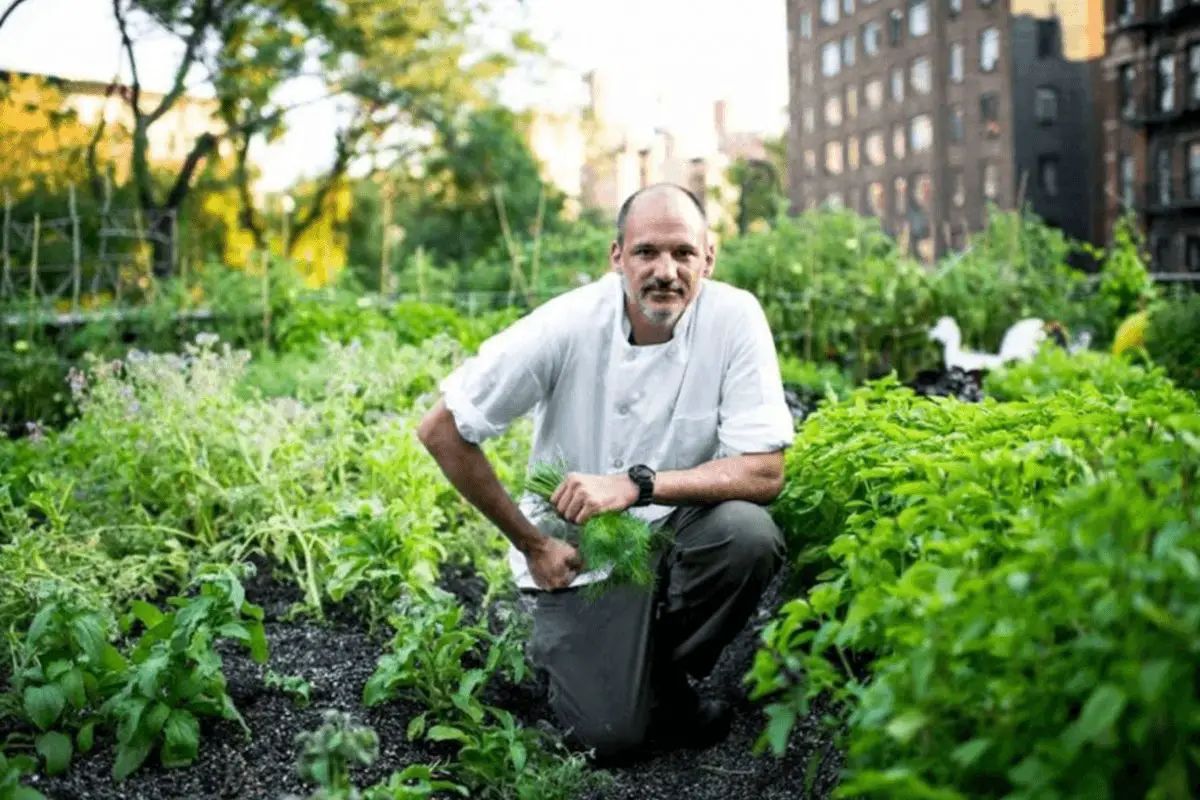5 Great Farm-to-Table Restaurants With On-Premise (Or Nearby) Gardens
The slow food revolution continues to sweep across the country. While restaurants in Europe and elsewhere have been utilizing locally sourced produce, meat and dairy for some time, Americans were slow to catch on. Beginning decades ago with activists like chef Alice Waters (Chez Panisse) restaurateurs around the country are continuing to realize the benefits of buying locally, whether its to help local farmers and purveyors or to have fresher and more beneficial foodstuff. If you live near a large city, chances are, you’ve eaten at a farm-to-table restaurant.
Eateries such as the storied French Laundry in Yountville, California, have been slow-food meccas for years. But unlike many locavore restaurants around the country, French Laundry has a working herb garden onsite, allowing for the freshest ingredients possible with the least environmental impact. Is this why chef Thomas Keller’s cuisine gets the highest praise of any American restaurant? Probably not but it definitely helps boost the quality and taste of the food. Following French Laundry’s lead, a number of other fine dining establishments around the country have taken farm-to-table to the next level: either using existing parts of their properties to build herb and vegetable gardens or purchasing nearby farmland to grow produce and raise livestock. Here are six of our favorites from around the country:
Bardessono, Yountville, California

This eco-chic, boutique luxury hotel in California’s Napa Valley has earned accolades for its commitment to sustainability and the environment. Nowhere is this more apparent than in the hotel’s two gardens, one onsite and one a short distance away from the property. Lucy’s Garden is a small green space located on the south side of the property. Here, culinary gardener Noel Lopreore works her magic on two large and two small vegetable and herb beds. The garden is mainly used for herbs and root production but Lopreore grows 18 different varieties of basil as well. The garden is certified organic through the CCOF, making Bardessono the first hotel with that distinction.


Bardessono also leases a quarter acre of land from the Hill Family (the hotel shares farm usage with the nearby French Laundry). The Hill Family Farm has been certified organic for more than 20 years and Bardessono’s portion has two orchards at which peaches, nectarines and citrus fruits grow. The farm also boasts an 8000-square-foot mixed vegetable garden, a 30-year-old black mission fig tree, apple and pear trees and a mulberry tree. Lopreore operates a year-round greenhouse at which she cultivates many of the crops, some of which change season to season. In 2010, the hotel focused on 300 different types of tomatoes as well as black and white garbanzo beans, cucumbers, squash, sun chokes and three different types of corn.
“Through the gardens we lower emissions by not trucking in the amount of food we grow. We also compost our kitchen scraps and use these in our gardens which lowers the need for trash pickup and adding to the landfill,” says Lopeore. “Besides all the environmental benefits, it provides our chef with the unique opportunity of being able to request unusual items like the Bhut Jolokia, which we grow on site. The Bhut Jolokia is the hottest pepper in the world.” See our full review of Bardessono.
Rosemary’s, New York, NY

Rosemary’s is an Italian restaurant with a rooftop farm situated in the heart of Greenwich Village. Created by Carlos Suarez, the owner of Bobo and Claudette, Rosemary’s is named after Suarez’s mother and is inspired by both her home in Lucca (Tuscany) and the rich heritage of the restaurant’s Greenwich Village corner.


Executive Chef Wade Moises serves seasonal Italian dishes that highlight the herbs and produce from the rooftop farm, as well as housemade pastas and a selection of focacce, as an homage to the location’s predeccessor, Sutter’s Bakery.
Uncommon Ground, Chicago, Il

Uncommon Ground lays claim to the first Certified Organic rooftop in the nation, which patrons can go up and visit. When dining there, I was pleasantly surprised at how much time their rooftop farmer spent giving me the grand tour of his elevated bounty and explaining the building process. The rooftop is fit with solar panels surrounded by manicured raised garden beds of herbs, tomatoes and more.
Obviously a rooftop can only supply so much for the restaurant, but the local concept goes beyond just their own building, to a commitment to source the majority of their food from local, sustainable organic producers – 24 percent of which comes from within 300 miles of the restaurant. Their menu is constantly changing according to the seasons, which makes each visit a unique experience that gives patrons a strong sense of time and place.

True midwesterners like myself can vouch for their hearty meatloaf, made with local grassfed beef and of course, wrapped in bacon and served with mashed potatoes, brussels sprouts, and fried nordic creamery cheese curds (a product commonly found amidst Chicago’s lively farmers markets). For dessert, I’d venture toward the seasonal crème brulee or s’mores tart.

They support the local economy by more than just helping out local farmers, but also local artisans, as you will regularly find local artist’s work featured inside and local musicians entertaining diners. See our full review.
Tupelo Honey Cafe, Asheville, North Carolina

Southern cuisine gets a bad rap as being fattening and highly caloric. Thanks to restaurants such as Tupelo Honey Café, Southern cuisine gets a chance to be hearty and healthy. The Asheville, North Carolina, restaurant lists gluten- and soy-free items and has garnered rave reviews for its char-grilled beef tenderloin and shrimp and grits. Tupelo Honey Cafe operates Sunshot Organics, a revitalized organic berry farm in Burnsville, North Carolina. The 12-acre farm boasts blueberries, blackberries, black raspberries and strawberries as well as edible flowers, greens, lettuces, asparagus, bush beans, cucumbers, herbs and heirloom tomatoes. The farm also keeps chicken for eggs.

Executive Chef/owner Briant T. Sonoskus isn’t new to organic farming. His grandparents had large gardens and stakes in community farms so the desire came naturally. “What I grow does vary a bit season to season. I have a large, fully automated greenhouse for winter growing but my production certainly goes down and is limited to a few cool weather crops. Making a menu item solely from my farm production is difficult but in partnering with other local farms you will see a lot of local combination effort items on menus or on the specials board,” says Sonoskus.
Sonoskus believes the benefits of having your own farm or garden outweigh the costs since customers are appreciative and return for the quality of the food. Growing large amounts of different items allow you to keep the costs down. See our full review.
SingleThread Farm, Healdsburg, California

Since opening in late 2016, no property in Sonoma has received more buzz than this five-room Inn designed by the restaurant architect gurus of AvroKO. Give the Inn and its designers their due but perhaps its greatest asset—bringing people from near and far to its property—is the Japanese-influenced, three-Michelin-starred restaurant which has drawn comparisons to Napa’s French Laundry. And like French Laundry, which helped champion in the use of locally sourced produce and livestock, SingleThread Farm has a full working farm, located five miles away, while a number of their ingredients, such as herbs, fruit, and vegetables, are sourced straight from their beautiful rooftop garden.

Nearly 80 percent of the ingredients come from the owners’ farm, which is located 10 minutes away between the Russian River and the historic San Lorenzo Ranch in Healdsburg, California. Farmed by Head Farmer Katina Connaughton along with the SingleThread Farm team, the property consists of a greenhouse, shade structures, loamy fields, chicken coops, an heirloom fruit orchard, olive trees, beehives, and a cattle paddock all surrounded by Cabernet Sauvignon, Zinfandel, and Chardonnay vines. The farm supplies vegetables, fruit, herbs, flowers, honey, eggs, and olive oil to the restaurant.
SingleThread ranks #71 on The World’s 50 Best Restaurant 2019 List.



